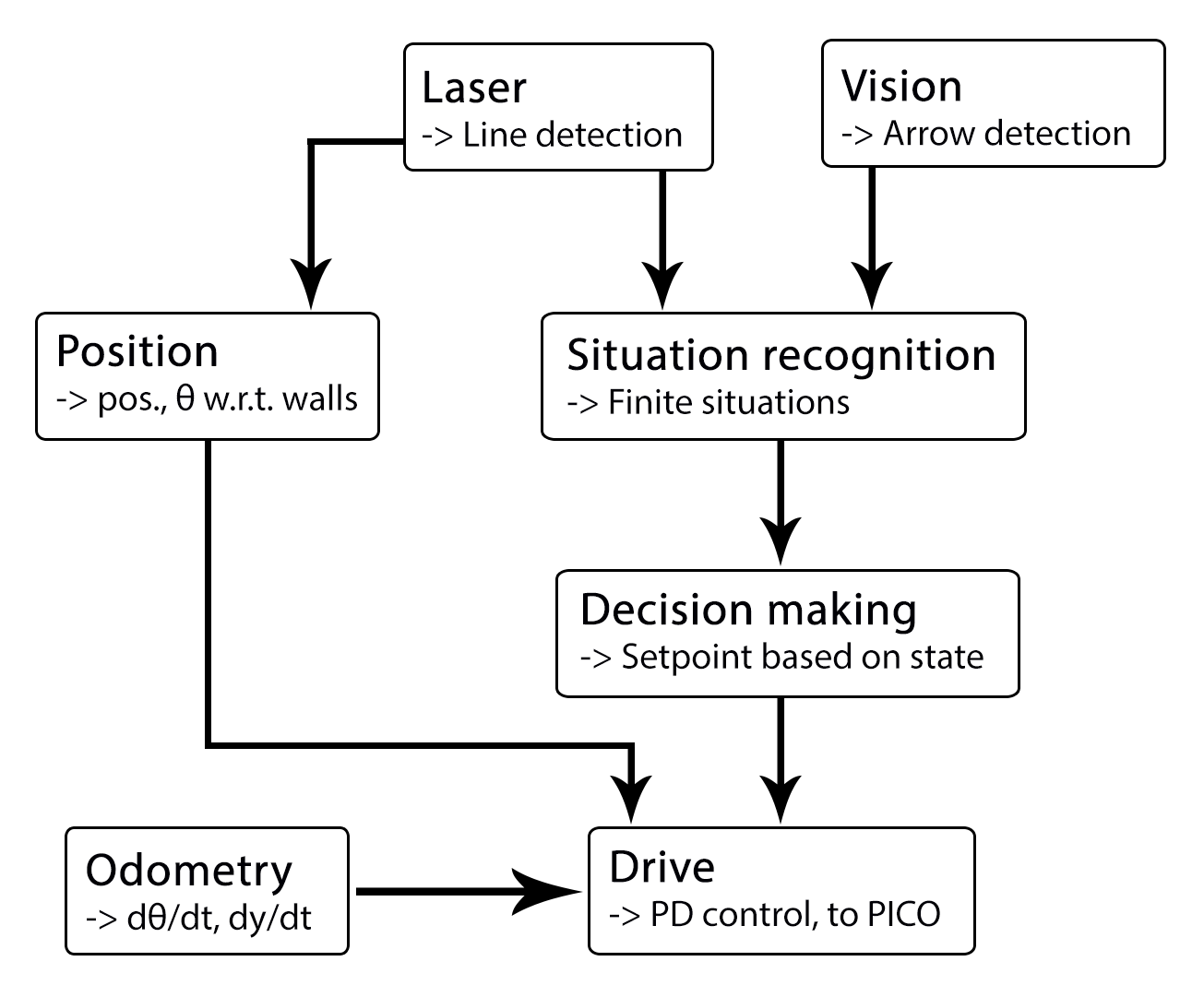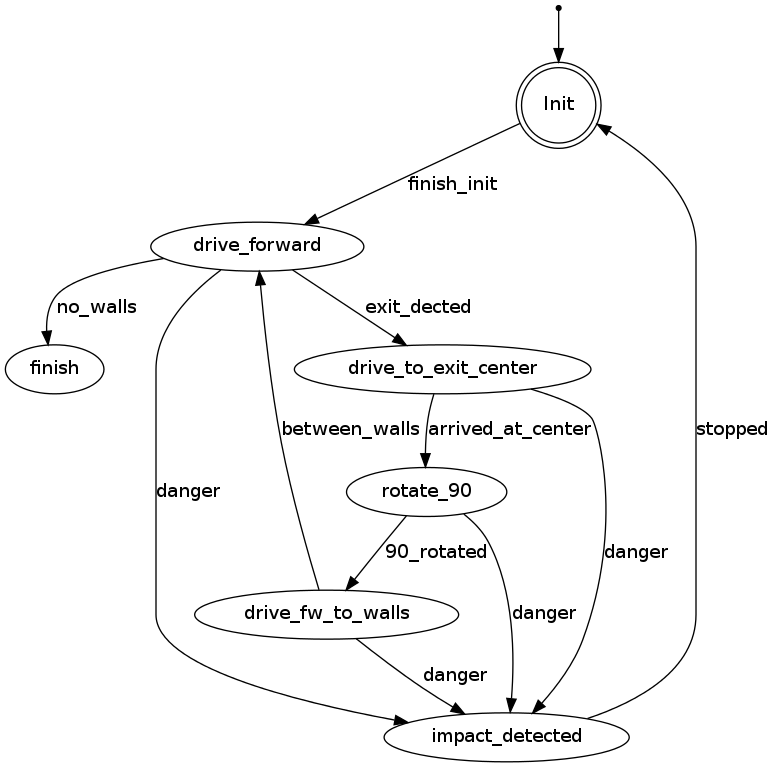Embedded Motion Control 2014 Group 1: Difference between revisions
| Line 142: | Line 142: | ||
output: lines consisting out of start and end point (x_1,y_1),(x_2,y_2) etc. <br> | output: lines consisting out of start and end point (x_1,y_1),(x_2,y_2) etc. <br> | ||
'''Position | '''Position''' | ||
inputs: line coordinates <br> | inputs: line coordinates <br> | ||
function: Determine distance to wall to left, right and front wall. Also determines angle theta with respect to the corridor. <br> | function: Determine distance to wall to left, right and front wall. Also determines angle theta with respect to the corridor. <br> | ||
output: (X_left, X_right, Y, theta) also named 'relative position' <br> | output: (X_left, X_right, Y, theta) also named 'relative position' <br> | ||
<br> | |||
The angle theta can be calculated with the next fomula:<br><br> | |||
<math>\theta = atan((y2-y1)/(x2-x1))</math><br><br> | |||
the position perpendicular to the line/wall is calculated with the next formula:<br><br> | |||
<math>X_r = x2 - ((y2-y1)/(x2/x1))*y2*sin(\theta_1)</math><br><br> | |||
'''Drive - Marc''' <br> | '''Drive - Marc''' <br> | ||
Revision as of 15:53, 14 May 2014
Group Info
| Name: | Student id: | Email: |
| Groupmembers (email all) | ||
| Sander Hoen | 0609581 | s.j.l.hoen@student.tue.nl |
| Marc Meijs | 0761519 | m.j.meijs@student.tue.nl |
| Wouter van Buul | 0675642 | w.b.v.buul@student.tue.nl |
| Richard Treuren | 0714998 | h.a.treuren@student.tue.nl |
| Joep van Putten | 0588616 | b.j.c.v.putten@student.tue.nl |
| Tutor | ||
| Sjoerd van den Dries | n/a | s.v.d.dries@tue.nl |
Meetings
Time Table
Fill in the time you spend on this course on Dropbox "Time survey 4k450.xlsx"
Planning
Week 1 (2014-04-25 - 2014-05-02)
- Installing Ubuntu 12.04
- Installing ROS
- Following tutorials on C++ and ROS.
- Setup SVN
- Plan a strategy for the corridor challenge
Week 2 (2014-05-03 - 2014-05-09)
- Finishing tutorials
- Interpret laser sensor
- Positioning of PICO
Week 3 (2014-05-10 - 2014-05-16)
- File:Presentatie week 3.pdf
- Starting on software components
- Writing dedicated corridor challenge software
Software architecture
We decided to use a architecture as seen as the following figure:

The components with their respective functions and in and outputs are listed here + who wil work on it:
| node | subscibes topic: | input | publishes on topic: | output | Description |
| Line detection - Sander | - | laser scan | lines consisting out of start and end point (x_1,y_1),(x_2,y_2) etc. | transformation of raw data to lines by use of hough-transform | |
| Position - Richard | line coordinates | (X_left, X_right, Y, theta) also named 'relative position' | Determine distance to wall to left, right and front wall. Also determines angle theta with respect to the corridor. | ||
| Arrow detection | camera | Arrow left of right | determine if pico sees an arrow and in what direction. | ||
| state recognition - Joep | lines, vision, relative position | an integer of whitch state is recognized | recognize situation and transform this to one of the states. | ||
| setpoint generator - Wouter | state, relative position | speed and position | Create setpoint for position of pico by use of state. (determine wanted position and speed). | ||
| Drive - Marc | setpoint, relative position | x,y,thata (Moving pico) | make sure that pico is positioned centered if this is needed and turn when needed.
|
Line detection - Sander
inputs: --
function: transformation of raw data to lines by use of hough-transform
output: lines consisting out of start and end point (x_1,y_1),(x_2,y_2) etc.
Position
inputs: line coordinates
function: Determine distance to wall to left, right and front wall. Also determines angle theta with respect to the corridor.
output: (X_left, X_right, Y, theta) also named 'relative position'
The angle theta can be calculated with the next fomula:
[math]\displaystyle{ \theta = atan((y2-y1)/(x2-x1)) }[/math]
the position perpendicular to the line/wall is calculated with the next formula:
[math]\displaystyle{ X_r = x2 - ((y2-y1)/(x2/x1))*y2*sin(\theta_1) }[/math]
Drive - Marc
inputs: setpoint, relative position
function: make sure that pico is positioned centered if this is needed and turn when needed.
outputs: (Moving pico)
state recognition - Joep
inputs: lines, vision, relative position
function: recognize situation and transform this to one of the states.
For the corridor challenge the following states are defined:
1. initialization
2. exit left
3. exit right
4. straight driving
5. collision
6. exit (stop with the program).
setpoint generator - Wouter
input: state, relative position
function: Create setpoint for position of pico by use of state. (determine wanted position and speed).
output: speed and position
PICO states corridor challenge
For the robot, the internal states can be visualized as in the following figure:
